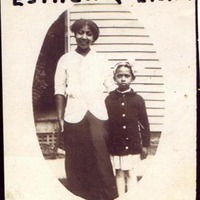Sixteenth Census of the United States, 1940
Item
-
Title
-
Sixteenth Census of the United States, 1940
-
1940 United States Federal Census
-
Creator
-
National Archives and Records Administration, 1940 (Washington, D.C.)
-
Publisher
-
Ancestry.com Operations, Inc
-
Place
-
Provo, UT
-
Date
-
2012
-
Extent
-
4,643 rolls
-
Language
-
English
-
Temporal coverage
-
1940
-
Description
-
From Ancestry.com, "An estimated 87 percent of Americans today can connect with at least one relative in the 1940 United States Federal Census—currently the largest census released to date and the most recent census available for public access.
Historical Background
Since 1790, the federal government has taken a census every 10 years to determine how members of the House of Representatives are apportioned. The U.S. census taken on 1 April 1940 was the 16th census of the United States. It tallied the population of the country at 131,669,275 for the continental U.S. This represented an increase of 7.2 percent for the continental U.S. since the 1930 census. Adding Hawaii, Alaska, Puerto Rico, Guam, the U.S. Virgin Islands, American Samoa, and the Panama Canal Zone (all included in this database) brought the total to 134,176,298.
To facilitate the count, census planners divided the country into enumeration districts. These were geographic areas designed to allow a census taker (enumerator) to visit every house in the district within a two-week period (in rural areas, enumerators had a month). Enumerators were instructed to “visit every house, building, tent, cabin, hut, or other place in which any person might live or stay, to insure that no person is omitted from the enumeration” and to count “each person alive at the beginning of the census day, i.e., 12:01 A.M. on April 1, 1940.”
Census enumerators wrote "Ab" after names of people who belonged to the household but were absent on April 1. Visitors were to be counted as members of the household at their normal place of residence, as were students, patients at hospitals and sanitariums who had a permanent home, and servants and household employees who did not sleep on the premises.
Because the official cutoff for the census was 12:01 a.m. on April 1, babies born later that day should not have been included. Residents of “hotels, tourist or trailer camps, missions, and cheap one-night lodging houses (flophouses)” were enumerated based on where they spent the night on 8 April 1940. Enumerators worked throughout the month and into May finishing the count."
-
Accessed online at Ancestry.com
Linked resources
Items with "Source(s): Sixteenth Census of the United States, 1940"
| Title |
Class |
| Acra, Jonathan |
Person
|
 Allen, Esther Allen, Esther |
Person
|
| Allen, Mary [3] |
Person
|
| Allen, William [3] |
Person
|
| Anderson, George W. |
Person
|
| Anderson, Lizzie |
Person
|
| Anderson, Lucy |
Person
|
| Archer, Delia Alene |
Person
|
| Armstrong, Charles E. |
Person
|
| Armstrong, Charles Edmond, Jr. |
Person
|
| Armstrong, Delores |
Person
|
| Armstrong, Virkett |
Person
|
| Armstrong, Walter Evans |
Person
|
| Artis, Martha Elizabeth |
Person
|
| Ayers, Myrtle |
Person
|
| Bailey, Ota Iris |
Person
|
| Baker, Benjamin Franklin |
Person
|
| Baker, Dora Bella |
Person
|
| Baker, Elizabeth Mae |
Person
|
| Baker, Gulliver Lee |
Person
|
| Baker, William Amos |
Person
|
| Barkshire, Hattie Ellen |
Person
|
| Beard, George |
Person
|
| Beard, Jessie M. |
Person
|
| Beard, Rosemare |
Person
|
 Allen, Esther
Allen, Esther